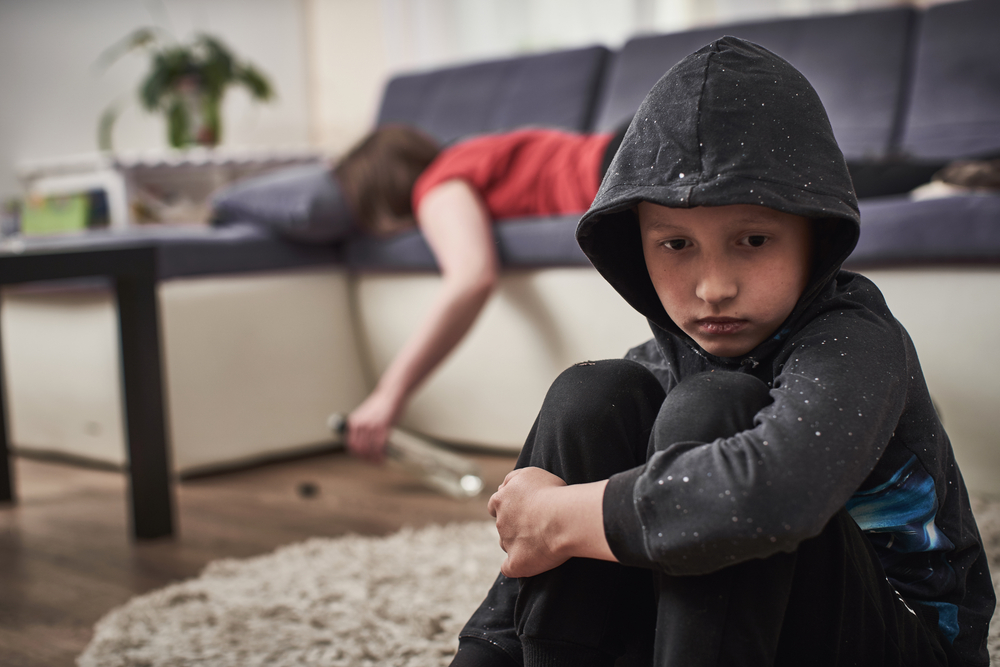Last Updated:
September 18th, 2025

Many of us look at the tribulations we faced during childhood and think, “Yes, I’ve conquered that issue,” or “Now I’m an adult, my responsibilities are completely different.”
Yet in many ways, when we hit adulthood, our problems do not suddenly dissolve. We are not immune to the same hardships and sensitivities we felt as children. Many of us still live life with an alcoholic or addicted parent to this day, though we may feel lost as to how we can help.
This help guide stands to support you if your parent is battling drug or alcohol addiction. We’ll give you practical steps so you can provide the greatest support possible and head towards a sober future.
How many people live with an addicted or alcoholic parent?
The exact number of people who live with an addicted or alcoholic parent is difficult to quantify, due to the factors of age and time. A person in their 80s, for example, will likely be much more affected by a drinking problem than a 20-year-old. We may look at some statistics of children who grow up with alcoholic parents, then mentally picture how late adulthood and old age naturally unfold, presenting more problems later in life.
The largest survey to date measuring the size and scale of family-related alcohol problems found that almost 5% of all adults grew up in a household where one or both parents drank too much (2 million adults in the UK). More than half of those said it caused issues at home and one-third carried these problems into their adult life. In addition, this doesn’t account for people whose parents develop an addiction later in life. This means millions of people are either currently living with an addicted parent, are still carrying the emotional traumas from childhood, or are developing new traumas from dealing with a parent’s later addiction.
It’s incredibly important to remember, regardless of your age, that you are not alone. Many adult children of addicted parents tread along the elusive line between wanting to help and not knowing how. Take comfort in that.
How can I support my parent without enabling them?
Having a parent with a drug or alcohol addiction can become even more complicated due to the nature of parent-child relationships. When the person who cared for you becomes the one who needs help, your entire world can feel like it has been inverted.
We understand that your heart may be aching to help them in every way possible, but without clear boundaries, your support may inadvertently worsen their situation.
Conceptualising support vs enabling
Every person’s relationship with their parent differs. One person may think of helping their parent by giving them a phone call, while another thinks of buying their groceries or taking them out for a pub lunch. Addiction support will mean empowering your parent to take responsibility for their actions, as well as their recovery. Enabling, on the other hand, shields them from the natural consequences of their behaviour, often out of love or fear.
- Support looks like: Encouraging their attendance at every session the treatment provider recommends, listening without judgement, or helping with logistics like booking appointments.
- Enabling looks like: Making an excuse for intolerable behaviour, bailing them out of problems caused by substance use, or pretending things are fine when they aren’t.
Understanding the distinction may be more personal to you, but you can fortify your efforts to support by conceptualising the difference.
Boundaries are not a betrayal
People of any age can feel guilty when drawing a line in the sand between themselves and a loved one. However, boundaries become an act of self-preservation in the face of family addictions.
A boundary might be saying
- “I’m here to support your recovery, but I can’t continue to be around you when you’re intoxicated.”
- “I won’t lie for you or cover up the effects of your drinking anymore.”
Even after the parent-child relationship has flipped, boundaries can make it clear what you can and can’t tolerate. They often act as the clearance needed for a space of healing to be set up.
Recognising and respecting your own limits
One of the most common ways a person’s support bleeds into enabling comes when they lose track of their own energy levels.
Think of yourself as a container filled with water, while your parent is also a container in need of filling. For how long can you pour yourself out and replenish them? Until your own container runs dry? As sad and as painful as it feels, you must recognise when you’re giving too much of your energy and running the risk of self-inflicted deterioration.
Should I be concerned about the heritability of alcoholism?
For adults and teenagers alike, there can be unsettling thoughts about whether a parent’s addiction may be in some way inherited. The sad truth is that you should pay attention to your own propensity towards addiction.
Studies overwhelmingly suggest that children of people with alcohol or substance use disorders are at higher risk of developing similar issues themselves. According to research, children of alcoholics are four times more likely to become dependent on alcohol later in life. That being said, this doesn’t mean addiction is inevitable. “Risk” is not destiny, but it may pay dividends to recognise the heritability of addiction, so you are better equipped to shield yourself from its dark temptations.
Practical steps to take today
Amidst the feelings of fear and negativity, it’s important to look for actionable steps if you’re concerned for the well-being of your addicted or alcoholic parent.
Try to cover these suggestions to make sure you’re showing the kind of love your parent needs:
Create your own boundaries and fortify them
Understand that boundaries are not walls, but are more like bridges towards a healthier future. Set clear limits around what you will and won’t tolerate. This can help protect your mental state and provide an anchor when you feel like you’re being pulled into their addiction. Decide what works for you, then stick by it.
Lean on a person who understands
Even outside of professional help, leaning on a good friend or family member may help lighten your load. Sometimes, just voicing or venting can provide the release you need in an emotional time. Look for people who have lived experience, as they might have valuable advice that they had to learn the hard way.
Learn as much as you can about their condition
As cliche as it may sound, knowledge is power. Learning everything you can about the nature of their addiction is one of the most effective tools for recovery. Ensure you’re picking up data from credible, scientifically backed researchers and let your loved one know what you’ve been learning. They hopefully won’t feel betrayed, defensive or condescended, because your desire to learn more only comes from a place of love and care.
Explore treatment options together
After exploring the other steps, if your parent is open to it, research treatment options together. Depending on their mental state, they may register this as a deep source of encouragement, without an overwhelming sense of pressure. Look into local detox providers, inpatient rehab centres and community support groups. Sometimes, just opening the door to conversation can enable them to take their steps through it. Show them that you’re invested in their recovery without forcing the issue if it’s possible.
I’m struggling – Where can I find help?
Being there for an addicted or alcoholic parent will take a toll on you, physically, mentally and spiritually. You may find yourself the captain and only member of a ship, navigating through grief, guilt, exhaustion and love, all at once. Please remember that you don’t have to remain alone.
Here at UKAT Liberty House, we understand how addiction impacts families, not just the person with the substance use disorder. Our compassionate team is here to help you explore treatment options. We’re ready to help you see how supporting yourself may also help you support your parents’ recovery.
Reach out to us today for the first steps towards healing. Together, we can step into a healthier future, free from addiction.
(Click here to see works cited)
- “Research.” Nacoa, 20 Dec. 2023, nacoa.org.uk/research-resources/research/.
- Aacap. Alcohol Use in Families, www.aacap.org/AACAP/Families_and_Youth/Facts_for_Families/FFF-Guide/Children-Of-Alcoholics-017.aspx





